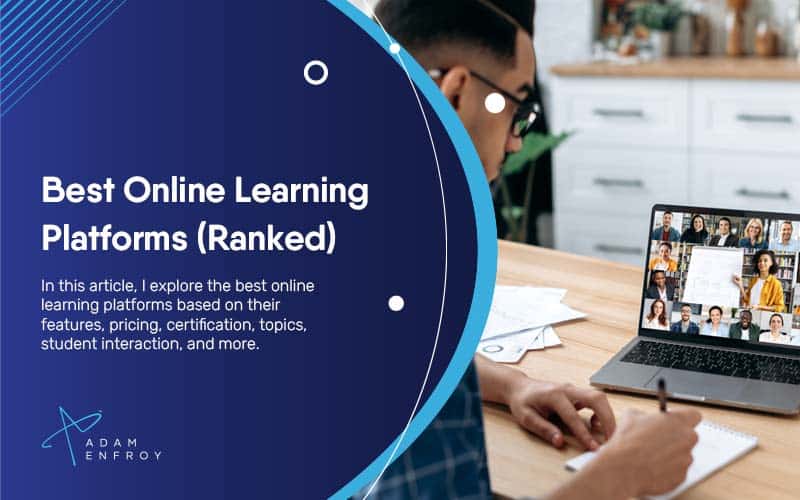
As the world embraces the transformative power of technology, the landscape of education has undergone a profound shift. Distance learning has emerged as a formidable force, empowering individuals to transcend geographical barriers and pursue their academic aspirations from the comfort of their own homes.
In this comprehensive guide, we delve into the realm of online education platforms, exploring the best options available for distance learners in 2023.
Online education platforms offer a plethora of advantages, including flexibility, cost-effectiveness, and accessibility. They cater to diverse learning styles and career goals, providing a tailored learning experience for each individual. However, navigating the vast array of platforms can be daunting.
This guide will equip you with the knowledge and insights necessary to make an informed decision, empowering you to choose the platform that best aligns with your unique needs and aspirations.
Online Education Platforms
Online education platforms have revolutionized the way we learn, providing access to quality education anytime, anywhere. These platforms offer a wide range of courses, from traditional academic subjects to specialized professional development programs, making them a valuable tool for lifelong learning.
The key features of online education platforms include interactive learning materials, virtual classrooms, and discussion forums that facilitate collaboration and peer-to-peer learning. These platforms also provide personalized learning experiences, allowing learners to progress at their own pace and focus on areas of interest.
Evolution of Online Education
The evolution of online education can be traced back to the early days of the internet, with the emergence of online forums and discussion groups. In the 1990s, the development of virtual learning environments (VLEs) marked a significant milestone, providing a more structured and interactive learning experience.
The widespread adoption of smartphones and tablets in the 2000s further accelerated the growth of online education, as mobile learning became more accessible. Today, online education platforms have become an integral part of the educational landscape, offering a flexible and convenient alternative to traditional classroom-based learning.
Factors to Consider When Choosing an Online Education Platform
Choosing the right online education platform is crucial for a successful distance learning experience. Here are some key factors to consider:
Learning Style
Consider your preferred learning style. Do you learn best through interactive simulations, video lectures, or written materials? Choose a platform that aligns with your style to maximize your learning outcomes.
Career Goals
Identify your career goals and select a platform that offers courses relevant to your field. Consider the industry’s requirements and the specific skills and knowledge you need to acquire.
Budget
Determine your budget and explore platforms that offer a range of pricing options. Some platforms may offer free or low-cost courses, while others may charge a subscription fee or tuition for individual courses.
Types of Online Education Platforms
* Massive Open Online Courses (MOOCs): Offer free or low-cost courses from top universities and institutions.
Online Degree Programs
Provide accredited degrees that can be completed entirely online.
Corporate Training Platforms
Offer courses designed for professional development and employee training.
Self-paced Learning Platforms
Allow learners to progress at their own pace and access materials on-demand.
Credibility and Reputation
* Check the platform’s accreditation and partnerships with reputable institutions.
- Read reviews and testimonials from previous learners to gauge the platform’s quality and effectiveness.
- Consider the platform’s industry reputation and recognition among employers.
Top Online Education Platforms for Distance Learning in 2023

Table of Online Education Platforms
The following table provides a comprehensive overview of the top online education platforms for distance learning in 2023, including their key features, pricing, and user ratings:
| Platform Name | Key Features | Pricing | User Ratings |
|---|---|---|---|
| Coursera | – Offers a wide range of courses from top universities and organizations
|
Varies depending on the course | 4.5/5 (Trustpilot) |
| edX | – Collaborates with leading universities to offer online courses and programs
|
Varies depending on the course | 4.2/5 (SiteJabber) |
| Udemy | – Hosts a vast library of courses created by expert instructors
|
Varies depending on the course | 4.7/5 (App Store) |
| LinkedIn Learning | – Focuses on professional development and career advancement
|
$29.99/month for individual subscription | 4.3/5 (Capterra) |
| Skillshare | – Emphasizes creative and lifestyle skills
|
$15/month for premium subscription | 4.6/5 (Google Play Store) |
Strengths and Weaknesses of Each Platform
Each online education platform has its unique strengths and weaknesses. Coursera and edX excel in offering courses from top universities and providing academic rigor. Udemy boasts a vast course library and affordable pricing, while LinkedIn Learning specializes in professional development and career-oriented courses.
Skillshare focuses on creative and lifestyle skills, fostering a community-based learning experience.
Target Audience and Suitability
The target audience and suitability of each platform vary depending on the learner’s goals and needs. Coursera and edX are ideal for learners seeking academic credentials or in-depth knowledge in specific subjects. Udemy and Skillshare are suitable for those looking to acquire practical skills or pursue personal interests.
LinkedIn Learning is tailored for professionals seeking career advancement and professional development.
Benefits of Online Education Platforms for Distance Learning
Online education platforms have revolutionized distance learning, offering numerous advantages that enhance the learning experience for students. These platforms provide flexibility, cost-effectiveness, accessibility, and personalized engagement, making education more convenient and effective for learners.
Flexibility and Convenience
Online learning platforms offer unmatched flexibility, allowing students to learn at their own pace and on their own schedule. With recorded lectures, interactive materials, and virtual classrooms, students can access course content anytime, anywhere. This flexibility is particularly beneficial for working professionals, parents, or individuals with busy schedules who may not have the time to attend traditional in-person classes.
Cost-Effectiveness and Accessibility
Online education platforms are often more cost-effective than traditional education methods. Students can save on transportation, parking, and other expenses associated with attending in-person classes. Additionally, online platforms often offer scholarships, financial aid, and payment plans to make education more accessible to a wider range of students.
Enhanced Engagement and Personalization
Contrary to popular belief, online learning platforms can foster engagement and personalization. Interactive simulations, virtual discussions, and online quizzes help keep students engaged and motivated. Additionally, personalized learning paths and adaptive technologies allow students to learn at their own pace and focus on areas where they need the most support.
Challenges and Limitations of Online Education Platforms
While online education platforms offer numerous benefits, they also come with certain challenges and limitations that learners should be aware of before embarking on their online learning journey.
Technical Issues
Technical issues can arise at any time during online learning, disrupting the learning process and causing frustration. These issues may include unstable internet connections, software compatibility problems, or hardware malfunctions. Learners must ensure they have a reliable internet connection and up-to-date software and hardware to minimize the likelihood of technical difficulties.
Lack of Face-to-Face Interaction
Online education platforms lack the face-to-face interaction that is present in traditional classroom settings. This can make it difficult for learners to connect with their instructors and peers, which can lead to feelings of isolation and a lack of motivation.
To overcome this challenge, learners should actively participate in online discussions, attend virtual office hours, and engage with their classmates through online forums and social media.
Self-Motivation
Online learning requires a high level of self-motivation and discipline. Learners must be able to set their own schedules, manage their time effectively, and stay motivated throughout the duration of their studies. Without sufficient self-motivation, learners may find it difficult to complete their coursework and achieve their learning goals.
Support Services
The availability of support services can greatly impact the success of online learners. Learners should ensure that the online education platform they choose offers adequate support services, such as technical assistance, academic advising, and counseling. These services can help learners overcome challenges and stay on track with their studies.
Community Engagement
Engaging with the online learning community can help learners feel connected and supported. Learners should actively participate in online discussions, attend virtual events, and connect with their classmates through social media. Building a strong sense of community can help learners stay motivated and engaged in their studies.
Future Trends in Online Education Platforms
The future of online education platforms is brimming with innovation and advancements. Emerging technologies are transforming the way we learn and engage with educational content. Let’s explore some key trends that will shape the online learning landscape in the coming years:
Emerging Technologies
Virtual Reality (VR) and Augmented Reality (AR):VR and AR technologies are making their way into online education, offering immersive and interactive learning experiences. Students can explore virtual environments, conduct experiments, and engage with educational content in a more realistic and engaging way.
Artificial Intelligence (AI) and Machine Learning (ML):AI and ML algorithms are being integrated into online learning platforms to personalize the learning experience. These technologies can analyze student data, identify areas for improvement, and provide tailored recommendations for learning paths and content.
Personalized Learning Paths
Online education platforms are moving towards personalized learning experiences. Students can now choose from a wider range of courses, customize their learning paths, and access content that aligns with their individual learning styles and goals.
Adaptive Content
Adaptive content technology adjusts the difficulty and complexity of learning materials based on student performance. This ensures that students are always challenged and engaged, while avoiding frustration or boredom.
Closing Summary
In the ever-evolving realm of online education, the future holds exciting possibilities. As technology continues to advance, we can expect to witness personalized learning paths, adaptive content, and the integration of artificial intelligence and machine learning. These advancements will further enhance the online learning experience, making it more engaging, effective, and accessible than ever before.
Embracing the transformative power of online education platforms empowers individuals to unlock their full potential, regardless of their location or circumstances. Whether you seek to enhance your professional skills, pursue a higher degree, or simply expand your knowledge horizons, these platforms offer a gateway to a world of learning opportunities.
As we step into 2023, let us harness the power of technology to democratize education and empower learners everywhere.
Question Bank
What are the key features to look for in an online education platform?
When choosing an online education platform, consider factors such as learning style, career goals, and budget. Evaluate the platform’s features, including course offerings, instructional methods, assessment tools, and technical support.
How can I ensure the credibility and reputation of an online education platform?
Research the platform’s accreditation, reviews from former students, and industry recognition. Look for platforms that adhere to quality standards and have a proven track record of delivering effective learning experiences.
What are the benefits of online education platforms for distance learners?
Online education platforms offer flexibility, allowing learners to study at their own pace and schedule. They are cost-effective compared to traditional education and provide accessibility to education for individuals who may not have access to physical institutions.